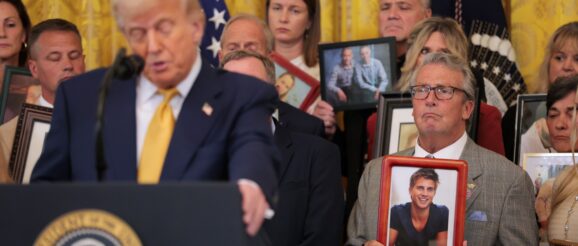U.S. fentanyl overdose programs to be funded “in increments”

The White House says a key national fentanyl overdose prevention grant program, currently underfunded by roughly $140 million, will eventually be fully paid for, but with a catch.

The federal money allocated by Congress will now be given out “in increments” rather than a single annual payment.
Speaking on condition of anonymity because they fear retribution for speaking with the press without authorization, four CDC staffers said it appears the grant money would be delayed past a key Sept. 1 deadline, when the current round of funding runs out, or could disappear altogether.
“The announcement [of delays] alone could trigger layoffs and program shutdowns,” one CDC staffer said. “It could really start a chain reaction that’s hard to come back from.”
But sources inside the CDC say it’s unclear how public health and addiction programs around the country will operate — hiring staff, signing contracts, and offering complex medical services — when roughly half their funding remains uncertain.
“A verbal commitment is not a contractual commitment,” said one CDC staffer, who said the administration’s system for reviewing and approving grants remains opaque. “This administration changes its mind a lot. We don’t even know why we only have 50 percent [of the OD2a funding] at this point.”

Administration officials declined to say why they’ve shifted to dolling out key public health dollars in incremental payments rather than annual disbursements. They also wouldn’t offer a timeline for when the remaining $140 million in OD2A funds might be sent to CDC for distribution.
Desai, the White House spokesman, suggested state and local public health departments should trust Trump to follow through on overdose prevention funding because he has made fighting fentanyl a key part of his second term.
“President Trump has done more than any other president to address America’s devastating fentanyl epidemic,” Desai said, pointing to efforts to secure the border, target drug cartels and Trump’s signing on Wednesday of the HALT Fentanyl Act that toughened criminal penalties for fentanyl trafficking.
But CDC staffers said the Trump administration has lost trust in recent months among many state and local health officials after clawing back billions of dollars in COVID-19 related grants and withholding funds for other public health grants managed by CDC, without offering explanation as to why.
Public health officials around the U.S., meanwhile, say the abrupt shift in funding for the OD2A overdose and addiction grants occurred without planning or communication, forcing some to pause future spending that relies on the federal funds.

CDC staffers said they also lack internal accounting systems needed to distribute money in the incremental way described by White House officials, especially when it’s unclear how grants will be reviewed or when the funds might be approved.
“Unfortunately the federal government is not nimble,” one CDC staffer said. “We will put out the money we have and [state and local public health departments] will have to do what they can.”
